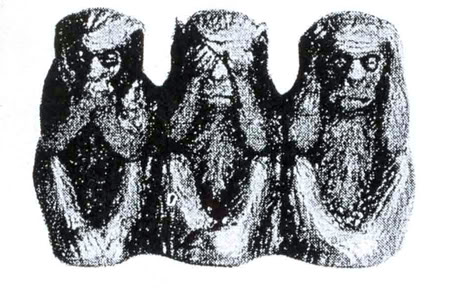Lecture No. 3
“Have you ever actually looked up the word feminist in a dictionary? It means equality between the sexes. It is not about hating men. This is very simple and you would know if you actually looked it up” – Diva
Following on from last week’s overview of Gynocentrism then and now, I propose that there is a common thread of female-worship running through, and linking, traditional conceptions of masculinity – historically expressed in what we might call ‘patriarchy’ – and feminism, which has taken over state and supranational institutions, and is poised to unleash the explicit persecution of men.
It may well take many more of these lectures before this is fully elucidated, but I mention it here for two purposes. The first is a reminder that reference to this common thread runs through all these musings: that Gynocentrism has been with us for a long, long time, and has only changed its form, not its content. This is the crux of Gynocentrism Theory, and it is the narrow focus which I am taking over a broad range of subjects.
Secondly, to shift the discussion towards feminism. There is the danger of reading into Gynocentrism Theory a minimization of feminism’s effects, considering that it is only the most modern version of a phenomenon which is centuries old. On the other hand, though, it is the most active form of Gynocentrism that we must presently deal with; it is the enemy, and as the all-singing, all-dancing tremendous final act in this regard, it is a phenomenon worthy of study in its own regard.
Better the devil you know! It is said that it is better to know thine enemy, but feminists are highly effective at obscuring their own intentions, actions, history, and penchant for the use of eristic. Amidst the smoke and mirrors, a chorus of shrill voices from all directions can be heard to proclaim, “it’s not our job to educate you about feminism!”
Fine – then we shall have to cast around for ourselves, burrow for gems of knowledge, and procure our own judgments on what feminism is. And since feminists themselves have disavowed their role as our educators, the conclusions which we reach shall require no sanction from them. If it is not their job to educate us about feminism, then it could hardly be anybody else’s but our own, could it? And yet, strangely enough, when we do seek out knowledge for ourselves, they object most vociferously to our findings, as though they do in fact covet the role of educator after all. It has been repeatedly suggested that we might like to check the dictionary.
This is a spurious request, not least because there is no ‘the dictionary’. There are, rather, dictionaries (plural). The Appeal to Dictionary is one which is made by people who, to put it bluntly, are not very bright. Such people apparently believe that language is a finite array of words, each carrying a single objective definition, the final arbiter of which is The Dictionary.
In the real world, language is ever fluctuating and it is corruptible. It is a collection of meanings, designated by terms – but quite how these are configured is determined by the vagaries of time and place! And very often, people disagree about how terms are, or should be, designated to meanings – and how meanings are, or should be, designated to terms!
The very existence of contested terminology, then, seems to refute the Appeal to Dictionary. Where disputes arise over the definition or use of a term, this is an indication that we have several meanings (or ideas, or concepts, if you prefer) huddled together under the same word-umbrella. To put it another way: there are several things, but they are all designated by the same word. A given configuration of terms to meanings may benefit certain people, and be of detriment to certain others!
Let’s take an example – sometimes, the claim that feminism supports women in making false rape allegations has been refuted by a reference to feminism’s stated support for sexual equality. “Feminism,” a feminist would say, “is about sexual equality, and nothing more.”
And yet false rape allegations still exist – as does feminist complicity in the making of them. This issue has only been deprived of recognition in language. The feminist has expertly obscured the complicity of feminism in the making of false rape allegations, by whitewashing the ideology as being “about sexual equality, and nothing more.” If we accept her argument that feminism only refers to support for sexual equality, then we no longer have any terms with which to discuss or understand false rape allegations, beyond viewing them as a series of unrelated incidents. Certainly, we wouldn’t be able to consider false rape allegations in their proper context, which is as part of a system of control and persecution. The phenomenon of a false rape allegation is surely not explicable by what we understand when we say “sexual equality,” and since feminism is about nothing more than that, we are left with no linguistic resources with which to meaningfully speak about it; we have been struck dumb. In short, we have an existing thing, but it is no longer designated by any words. How then could we draw attention to it, criticize it, oppose it?
Let’s take another example. A feminist may well create a false partition in the problem of Father’s Rights by defining it in such a way that feminist culpability is overlooked. She could, for instance, say that “patriarchy is to blame for the unequal treatment of fathers.” Once again, she has controlled the language – meanings are split between terms, or they are compressed into one, and the intended outcome is that the guilty party avoids being taken to task!
Now, you might think – “why does this matter? A feminist might say this or that, but I don’t believe her; my own experiences tell me that it’s not true, and I’m unlikely to be fooled by what she says.”
That’s all well and good. But there are a lot of people out there who will be fooled by what she says – including those who possess the very real physical power to imprison you, destroy you, or alienate you from your loved ones. Feminists aren’t just saying this to people like you and I – their nonsense gushes forth in all directions, like crude oil from a burst pipe, flowing towards anybody who will listen, and especially those who can “do something about it.” Their message comes through, louder than a rushing waterfall, whether you want to hear it or not – and their whole project depends upon the relentless repetition of a dozen or so mantras, and the sinking of their sentiments into the collective subconscious. This is why they endlessly prattle on, typically parroting stock phrases like subordinate cells in a hive mind! They do it because it works – at least, until somebody stands up and points out that the Emperor’s not wearing any clothes.
And then, all hell breaks loose!
It was necessary to speak at length on this point, because we must realize that political language is never neutral, and implications are always hidden in the configuration of ideas and terms. The role of Men’s Rights Advocates is to critically assess the feminist use of language, and to determine where we would be well-served to separate out several ideas which are referred to by one term, or to compress several terms into one. We should never respond to a feminist argument without first looking critically at the terms through which it is being conducted. To put it in Gamespeak, we must “control the frame!”
The Appeal to Dictionary can be summarily dismissed. Official dictionaries represent establishment positions. Feminism, as it is in vogue, is officially defined in the way that its adherents would like the world to see feminism; it is not defined in a way that describes, or accounts for, the totality of the project. That which happened, or still happens, but does not reflect the establishment view, is simply ignored. To define feminism as
the advocacy of women’s rights on the grounds of political, social, and economic equality to men…
is to brush aside much of its unpleasant history – and to deprive skeptics of the resources for an unofficial linguistic and historical analysis of the term. This old revision of the Wikipedia page ‘Feminism and Equality’ contains plenty of material which disputes the black-and-white dictionary definition, although the page itself has fallen prey to the very same forces which seek to delimit the linguistic opportunities of their critics. Thankfully, Wikipedia archives old versions of its articles, so the efforts of one Nick Levinson in exposing the explicitly anti-male tenor of several famous feminist works has not gone to waste. Let’s get cracking!
Jill Johnston, in Lesbian Nation, called for men to eliminate the qualities they hold as men. “Man is completely out of phase with nature. Nature is woman. Man is the intruder. The man who re-attunes himself with nature is the man who de-mans himself or eliminates himself as man […] A small but significant number of angry and historically minded women comprehend the women’s revolution in the visionary sense of an end to the catastrophic brotherhood and a return to the former glory and wise equanimity of the matriarchies.”
Mary Daly, in Gyn/Ecology, wrote in favor of reversing power between the genders […] “As a creative crystallizing of the movement beyond the state of Patriarchal Paralysis, this book is an act of Dis-possession; and hence, in a sense beyond the limitations of the label anti-male, it is absolutely Anti-androcrat, A-mazingly Anti-male, Furiously and Finally Female.”
“Do women need land and an army . . .; or a feminist government in exile . . .? Or is it simpler: the bed belongs to the woman; the house belongs to the woman; any land belongs to the woman; if a male intimate is violent he is removed from the place where she has the superior and inviolate claim, arrested, denied parole, and prosecuted. . . . . Could women ‘set a high price on our blood’?” – Andrea Dworkin
Phyllis Chesler, in Women and Madness, drew on matriarchal history, Amazon mythology, and psychology and, with some ambivalence about relying on biology alone as a justification, argued that a war between the genders has always been underway and that women would benefit from using their full powers to be the exclusive wielders of political power to produce an unequal society in which men live but are relatively powerless, even if such a society is no more just than a patriarchy, and called for feminist women to dominate public institutions in their self-interest. “Amazon society, as mythology, history, and universal male nightmare, represents a culture in which women reign culturally supreme because of their gender […] In Amazon society, only men, when they were allowed to remain, were, in widely differing degrees, powerless and oppressed […] If women take their bodies seriously—and ideally we should—then its full expression, in terms of pleasure, maternity, and physical strength, seems to fare better when women control the means of production and reproduction. From this point of view, it is simply not in women’s interest to support patriarchy or even a fabled ‘equality’ with men.”
One organization that was named The Feminists was interested in matriarchy. Two members wanted “‘the restoration of female rule'”.
Unless the aforementioned organization and books did not really exist, we are forced to conclude that feminism cannot only have been about the advocacy of women’s rights on the grounds of equality with men. At the very least, what we must say is that some feminists may have supported equality, while other feminists have overlooked equality and have outright supported female superiority. And neither can the latter group be reduced to a handful of fringe lunatics. As Nick Levinson points out (much to the chagrin of feminist moderators), two and a half million copies of Phyllis Chesler’s Women and Madness were sold.
That’s a whole lot of hate.
And a whole lot of energy is spent actively sweeping this kind of thing under the rug, by those who have since realized how damaging honesty can be to one’s case. Modern feminists are far more rhetorically disciplined than their forthright foremothers, and have concluded that unpopular plans are not helped into motion by being discussed openly. Rhetorical discipline adds a whole new layer of subterfuge to all that has been said regarding the designation of terms to ideas. It will not suffice only to look at what they say; we must watch carefully what they do. And haven’t some of the above recommendations come true, per the actions of feminists? Is it not now the case that male intimates accused of violence are removed from their homes in which the woman has the superior and inviolate claim, as Andrea Dworkin hoped for? Have feminist women not dominated public institutions in their own interest, as Phyllis Chesler advocated? As Gynocentrism Theory tells us, women already had a “high price on their blood” – much higher than that of men, at almost any time in history. This simple fact is the reason why it was possible for the prescriptions of radical feminists to be achieved in the first place – and for dissidents to have been so effortlessly marginalized.
Still, times change. Establishments are overturned, and words are officially redefined. If the new definition of a word proves more accurate, then it must have existed for some time, unofficially, before the word’s revision. Sometimes, establishments must change before terms catch up. The dictionary lags behind definition, because the establishment is stuck in the mud. I predict that, as we reach a critical mass opposed to feminism, and shortly before its collapse, we may well see some concessions in the form of alternative definitions of the term becoming accepted.
Adam
Further Reading:
J. Durden. Feminism as a Language Ideology
ArgusEyes. Why I am NOT a Feminist
Davout. Oxford English Dictionary massacres the definition of “anti-feminist”
GYNOCENTRISM THEORY LECTURE SERIES:
1. Staring Out From the Abyss
2. The Same Old Gynocentric Story
3. Refuting the Appeal to Dictionary
4. Pig Latin
5. Anatomy of a Victim Ideology
6. Old Wine, New Bottles
7. The Personal, as Contrasted to the Political
8. Chasing Rainbows
9. False Consciousness & Kafka-Trapping
10. The Eventual Outcome of Feminism, Part I
11. The Eventual Outcome of Feminism, Part II
12. How to Break a Dialectic








